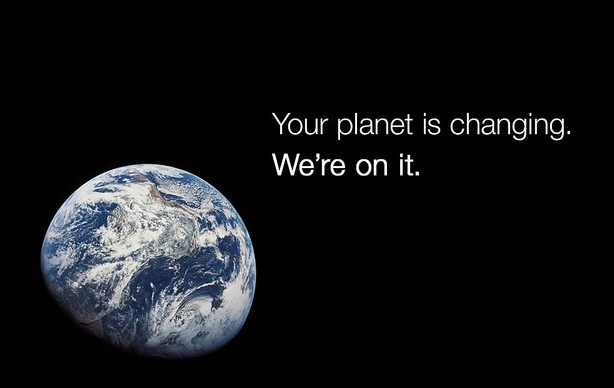 The announcement coming out of the G7 meetings yesterday is another step in solidifying commitment towards a clean energy future. Although such pronouncements are easier to make than realistically deliver (particularly ones with an 85 year time horizon!), there is a clear shift in gears as global leaders seem to be taking a stronger stance in supporting the long-running recommendations of the IPCC. This is all leading up to the Paris conference at the end of the year, and the groundswell of sentiment around this important occasion seems more hopeful that serious advances might be made than at previous conferences. The effects of climate change are beginning to become far more evident, and the science continues to dispel many of the deniers holding back the political process.
The announcement coming out of the G7 meetings yesterday is another step in solidifying commitment towards a clean energy future. Although such pronouncements are easier to make than realistically deliver (particularly ones with an 85 year time horizon!), there is a clear shift in gears as global leaders seem to be taking a stronger stance in supporting the long-running recommendations of the IPCC. This is all leading up to the Paris conference at the end of the year, and the groundswell of sentiment around this important occasion seems more hopeful that serious advances might be made than at previous conferences. The effects of climate change are beginning to become far more evident, and the science continues to dispel many of the deniers holding back the political process.
Alongside such commitments from political leaders, we have seen massive divestment campaign successes that have communicated a popular shift against established energy companies whilst also pushing support for innovation in renewable energy sources. Coinciding with these campaigns, and presumably at least in part encouraged by them, there has also been a noticeable shift in business sector sentiment. The need to properly factor climate change exposure into investment portfolios and long-term business strategies is rapidly becoming understood as the new norm, even when just considered from a purely profit-driven motivation.
Public sentiment has also emboldened those business leaders who have a more visionary view on the role of the private sector in helping to deliver an environmentally sustainable future. The recent announcement from Elon Musk about the forthcoming Tesla Powerwall shows how ripe the consumer market is for innovative responses to the energy problem. Added to these kinds of moves, the continually lowering costs of solar power and other forms of clean energy will prove to be the fulcrum needed to rapidly shift industry towards a new energy goldrush. As unfortunate as it is to say it, the shift is seeing leverage largely because there’s money to be made from doing so.
So, there’s a lot of hope in the air. A lot of optimism about the capacity for science and technology, when driven by political and business willpower, to overcome the worst of the devastating impact of global climate change. It’s a decidedly utopian place to be, which I guess makes sense as a counterbalance to the fatigue about apocalyptic predictions for the future. When faced with a problem so all-encompassing and potentially catastrophic, there’s a real risk of falling into a collective denial that is psychologically unable to assess the true weight of the situation. We know it’s important on an intellectual level, but it’s easy to ignore because our emotions are protected by the comfort of turning a blind eye. Overcoming this kind of cultural denial is an absolutely vital next step in ensuring that these positive moves and pronouncements can find traction, and are able to see quick progress as a result.
It’s here that widespread issues of global inequality become drawn into consideration. The impact of climate change on developing economies, and the people that together form those economies, will be disproportionate and devastating. Issues surrounding drought, food shortages, natural disasters, refugee crises and national instability will all be exacerbated. Solving the energy problem is important, and is the crux of the issue to be sure, but the geopolitical problems that will result from climate change run much deeper than merely figuring out how we are going to convince the juggernaut energy industry to turn course.
Interestingly, there is growing evidence that developing countries will be able to actively leap ahead when it comes to energy infrastructure innovation and widespread implementation of clean energy. For many of these countries, it looks hopeful that an immediate shift to newly available technologies might enable them to skip over a heavy reliance on fossil fuels altogether.
The key to this will be ensuring that the cost of such technologies decreases rapidly (something that technology, in general, has always been very good at doing) and that there is a co-ordinated international effort to assist any community with a genuine interest in implementing such projects on a large scale. The G7 leaders might soon be following the lead of developing countries that have shown greater commitment to embedding clean energy into the fabric of their national infrastructure and cultural identity. If that ends up being the case, we will certainly owe them more than a simple show of gratitude.
 In order for this G7 announcement to have real meaning then political leaders must be held to account. We need to promote a more transparent and inclusive approach to policy formation, and through that a more integrated form of decision-making. This will require a considerable show of goodwill from the business sector, which have developed very effective back-channels of influence through extensive lobbying procedures, but there is a massive opportunity in focusing public trust and loyalty for those businesses able to do so.
In order for this G7 announcement to have real meaning then political leaders must be held to account. We need to promote a more transparent and inclusive approach to policy formation, and through that a more integrated form of decision-making. This will require a considerable show of goodwill from the business sector, which have developed very effective back-channels of influence through extensive lobbying procedures, but there is a massive opportunity in focusing public trust and loyalty for those businesses able to do so.
The global ramifications of getting this wrong might be too devastating for many to truly face (even if consciously they think they are doing so), but when pivot points emerge it’s vital that we take advantage of the positive sentiment for change and push the dial even further towards a more sustainable and prosperous future for all.




